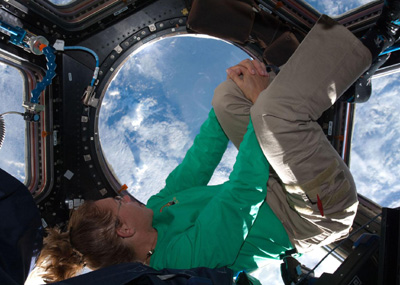Goodbye, Shuttle
Parting thoughts
The space shuttle has been well eulogized in recent weeks, and we’ve already said our own farewells in print and on the web. So no need for another Grand Tribute.
Still….I can’t resist a couple of parting thoughts on this final day of the 30-year shuttle program.
The safety of the shuttle can be debated, particularly when public attitudes about risk have changed since the time the vehicle was designed in the 1970s. But here are the final numbers: Out of 852 astronauts carried into orbit, 14 were lost, giving a 1.6 percent fatality rate for this particular mode of space travel. Compare that to Apollo, which, if you count the Apollo 1 fire (and why wouldn’t you?) had a fatality rate of 8 percent (3 out of 36 crew members). Are these kinds of safety figures meaningful? In 2009, 816 construction workers died from job-related accidents in the United States alone. What’s an acceptable amount of risk for astronauts? How safe is safe? That, and the question of how much we’re prepared to spend, remain central to the future of the U.S. space program.
On their last full day in orbit, the STS-135 astronauts waived their private consultations with the NASA doctor on the ground, which is up to the crew’s discretion. “Thank the Surgeon for coming in,” radioed Commander Chris Ferguson, “but I think we’ll pass.”
I like to think it’s because they were feeling so good. This crew—Ferguson, Doug Hurley, Sandy Magnus, and Rex Walheim—worked hard for two weeks, but they also seemed joyful and alive to the fullness of the moment. Ferguson, who was asked “How do you feel?” more than anyone should have to endure, answered each reporter’s question with patient grace. In fact, the entire astronaut corps deserves a hand for trying—sincerely, as far as I could tell—to communicate their experiences to the public.
On their last night in space, no one was around to bother them, and I hope they all took time, even gave up sleep, to look out the window. Ferguson said he reminded his crew to “make a memory, because you’re never going to see anything like this again.” The Apollo astronauts often say that their time on the moon went by too fast, due mostly to the tyrannies of the timeline. Big mistake. If we send people into a new environment, they need time to experience it. Otherwise, what’s a human spaceflight program for?
The shuttle’s end came 42 years and a day after Neil Armstrong and Buzz Aldrin landed on the moon. Back in 1969, Gene Kranz and crew celebrated that triumph with cigars, but smoking isn’t allowed in Mission Control any more, and today they had cake and flowers instead. The Apollo era is over, and now the shuttle era has ended too. What follows is uncertain. But it can be every bit as exciting and courageous as the last space age, if that’s what we really want.
